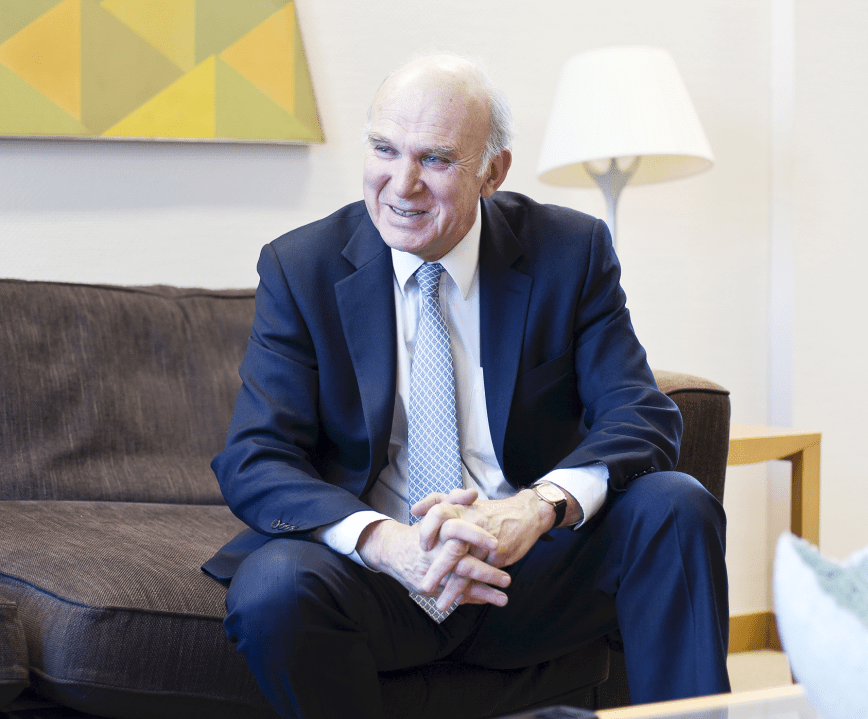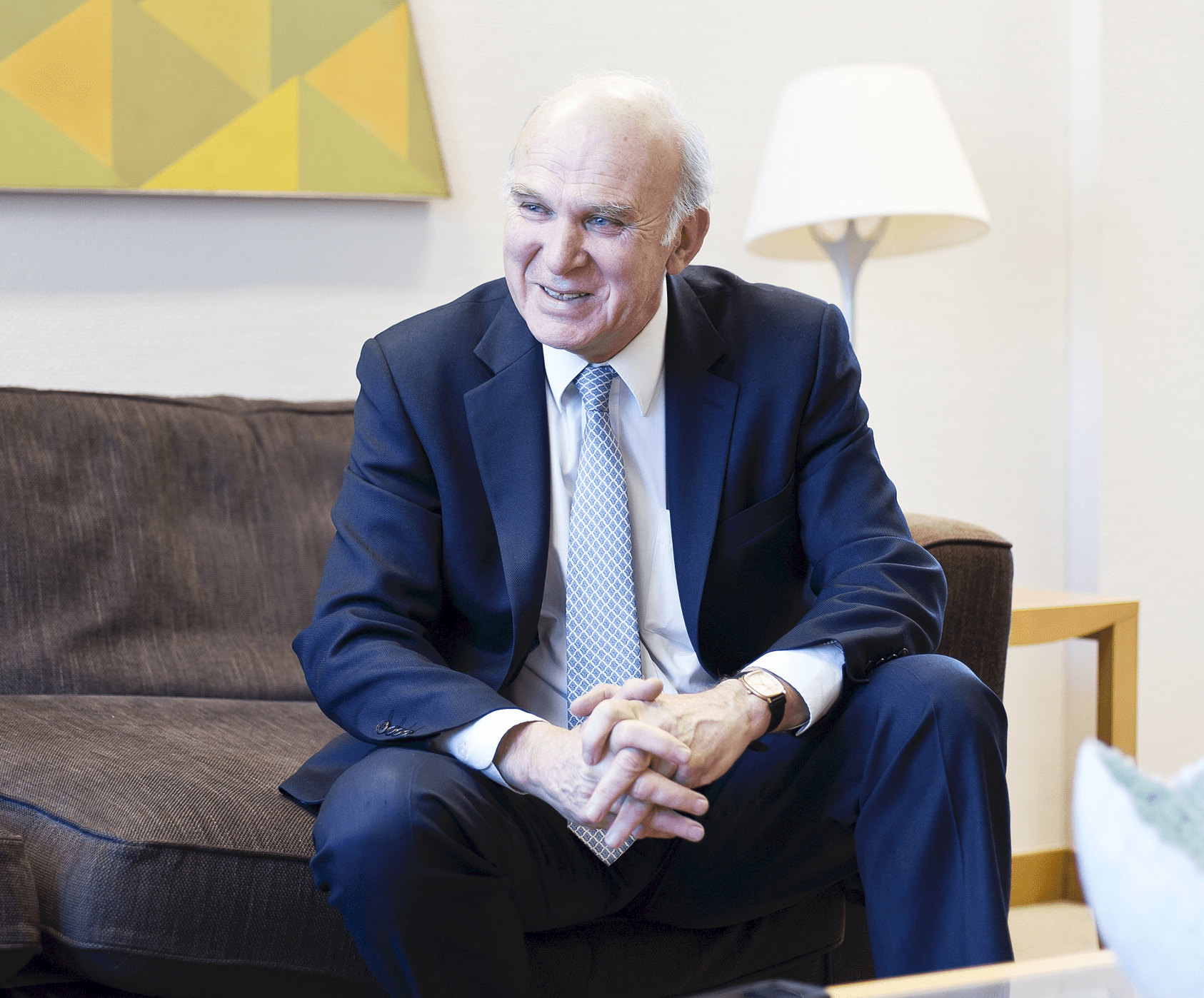Sir Vince Cable is talking about Brexit and damaged bicycle wheels. ‘The metaphor I like to use when talking about the economic consequences of Brexit is a slow puncture,’ the 77-year-old explains from his home in Twickenham, South West London. ‘Because effectively we’re losing access to Britain’s largest market of goods and services.’
‘I was initially encouraged that Brexit campaigners wanted to pursue an open and global Britain,’ he says. ‘And I think that’s absolutely right because that is very much part of the old free trade tradition… But we are now in a world which is probably going in the opposite direction. And I fear that Britain now stands to be isolated.’
Cable is well-placed to know about the difficulties of Brexit. As Liberal Democrat leader, he oversaw the party’s ‘Bollocks to Brexit’ campaign in the 2019 European elections, and for two years was business secretary in the coalition government. These days though, he is more interested in teaching and writing than the political fray. He is visiting professor in practice at the London School of Economics and earlier this year published a new book, Money and Power: The World Leaders Who Changed Economics.
The book begins at the turn of the 18th century, when there was what Cable calls ‘a step-change in the sophistication of a global economies, industrialising societies, and when recognisably modern, democratic institutions became apparent.’ He then profiles 16 political leaders from 12 different countries over that time span.
That motley crew includes democrats and autocrats from both the left and the right. They all share one commonality: they took radical – and often unpopular – decisions that changed the economic paradigm of their respective countries during the time they governed. Cable’s book looks at figures like far-left Bolshevik Russian revolutionary leader Vladimir Lenin; the populist Argentine president and fascist sympathiser Juan Domingo Perón; 19th century Conservative German statesman Otto von Bismarck; and the 45th President of the United States, Donald Trump.
‘State capitalism has worked spectacularly well in China’
Cable also dedicates an entire chapter of his latest book to the most influential Chinese statesman of the 20th century, Deng Xiaoping, who became China’s paramount leader in 1978 and began an economic miracle unparalleled in human history – rapidly transforming China from a traditional agrarian society to a modern urban nation. Deng had no time for social reform but he was a pragmatist on economic matters. Since 1979 China’s productivity has increased 20-fold, lifting 850 million Chinese citizens out of poverty.
Cable says the key to Deng’s success was political pragmatism: Deng listened to Milton Friedman’s ideas about markets as studiously as he read Marx. The method Deng applied to open China up globally for business was a cautious but effective state capitalism. The invisible hand of the market was allowed to work its magic, but the authoritarian rules of a one-party communist system still applied.
‘State capitalism has worked spectacularly well in China,’ says Cable. ‘It’s played a major role in China’s brilliant economic success story so far.’
There are many factors to consider when trying to predict the rise of China over the coming years and decades, he says. The ongoing trade war with the United States. The fact that China has the largest standing military on the planet, as well as the largest national economy. Cable believes the prospect of China overtaking the United States as the world’s number one global superpower ‘is painful and potentially dangerous.’ But he says the West should take a Kissingeresque balance of power approach to China. And that diplomatic engagement must begin and end with three key words: ‘realism, restraint, and realpolitik’.
In recent months, the former Liberal Democrat leader has faced criticism for his perceived appeasement of Beijing. But Cable is insistent that the West should not take an antagonistic approach towards China.
‘The sensible approach to China is to be pragmatic and to engage with them,’ says Cable. ‘[In the West] we’ve got to recognise that we have much in common with China. And that we can benefit –economically and in other ways – by engaging with them.’
‘There are a lot of people in the West who are spoiling for a fight with China. But I don’t think that’s helpful,’ he adds.
Another chapter of Cable’s book discusses Margaret Thatcher. Perhaps surprisingly for a Liberal Democrat, Cable believes Thatcherism was largely misunderstood, and even praises Thatcher herself.
‘Margaret Thatcher was primarily driven by moral concerns: now those moral concerns were not shared by [Thatcher’s] critics, but they were predominantly moral nevertheless.’
Still, he admits as a loyal Liberal Democrat it was a difficult writing a chapter praising a radical Tory. ‘I [had to try and] separate out my own prejudices,’ he says. ‘I wanted to look at the evidence of Thatcherism, stand back from it, and try to make some assessment of its contribution [to British politics] which was very big.’
‘It was Thatcher’s government that got on top of inflation,’ says Cable. ‘That happened indirectly as a result of her decision to get rid of exchange controls, which drove up the pound. But she did it in a rather brutal way that had a terrible effect on British manufacturing.’
The other lasting legacy of Thatcherism was privatisation. Cable notes that it has ‘permanently changed the British political landscape and how many other countries in the world followed the British model.’
The intellectual case for free markets and private enterprise wasn’t Thatcher’s starting point though, says Cable. ‘[Thatcher] began with the idea that socialists and communists were fundamentally wicked and immoral— and that [as a society] we have to be free.’
Cable points out that the anti-socialist revolution Thatcher’s Conservative government began in Britain was chiefly inspired by Friedrich von Hayek, the father of neoliberalism. He believes Hayek’s intellectual influence on Thatcher is a perfect example of economic theory making the transition to political reality. Market forces typically tend to shape economic outcomes. But Cable stresses a more important factor: a nation’s economic destiny is usually shaped by politicians – they take crucial decisions on economic matters at critical moments in history.
When it comes to the future though, Cable doesn’t have much optimism that politicians can fix the global economy. He believes there will be a short-term recovery as the lockdowns are lifted. ‘By the end of 2021 and the start of 2022 we are going to see rapid growth in the world economy,’ he says. ‘But it may take several years to get back to the level we were at before.’
And he identifies two major problems from the Covid crisis: Governments being loaded with debt and a huge fall in productivity. ‘The next decade is going to be a real struggle,’ says Cable. ‘And it’s going to be worse in the poorest countries that have the fewest resources to deal with it. So there will be a short term recovery. But real damage has been done.’







Comments